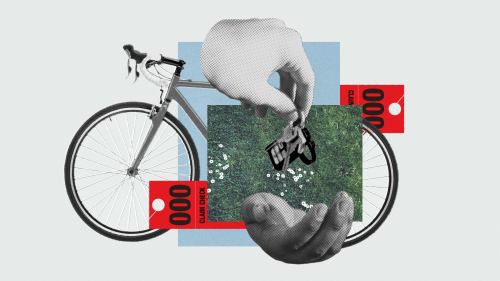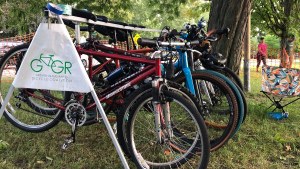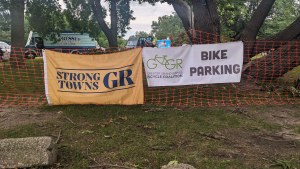Europeans and Chicagoans are both tired of stolen bikes. A Midwestern Marine found a solution.

Midwest biking activists are using a grassroots strategy to highlight the lack of secure bike infrastructure in the region.
Compared to Chicago, the Netherlands seems like a bike utopia. Dutch people own more bikes per capita than any country — almost 1 in 4 people bike daily, and 36% of people say their bike is their primary mode of transport. But the European Cyclists’ Federation admits that Europe doesn’t have it all figured out either.
These biking advocates, together with the European Parliament, agreed that there were two major obstacles to getting more people on bikes: dedicated bike lanes and safe bike parking.
Chicago also shares these challenges. Like most other big U.S. cities, Chicago has a bike theft problem. During 2020, as many as 200 bikes were stolen per month. In the last year, 500 bikes have been added to the stolen bike registry — and this is likely a big undercount.
However, biking activists in the Midwest are using a surprisingly deluxe grassroots strategy to highlight the lack of secure bike infrastructure: valet parking.
Europe’s plan to double cycling
Early in 2023, the European Parliament passed a resolution calling to double the total number of miles people cycle each year by 2030. But the parliament specifically raised the lack of secure bike parking as a barrier preventing more people from cycling.
“If there’s not a safe place to park your bike, that could be another barrier,” said Jill Warren, the CEO of the European Cyclists’ Federation, which consulted with the European Parliament to draft the resolution.
Subscribe to ChicagoGlobal
This story first appeared in the ChicagoGlobal newsletter, a joint project of Crain's Chicago Business and the Chicago Council on Global Affairs.
Warren notes that Brussels, where she lives, devotes much of its public space to cars, whether moving or parked. She views expanding bike infrastructure as a key component of city planning that “aims to change that balance and to give a lot more space back to people.”
Many urbanists and biking advocates in the U.S. share Warren’s frustration with car-centric design.
“The way that we have been building cities in the U.S. and Canada since at least World War II is making our communities more fragile,” said John Pattison, a community builder at Strong Towns.
Valet parking as a solution
Valet parking for cyclists isn’t new. At least one San Francisco Bay Area cycling group has offered valet bike services since the late 1990s. For over a decade, the Cubs have offered valet parking for cyclists; the Bears, Fire, and even the Logan Square neighborhood farmers markets have all implemented valet bike parking.
But bike parking isn’t just an obstacle in cities, Pattison explained. Suburbs struggle with a lack of bike parking too, which is compounded by the long distances between neighborhoods, offices, grocery stores, and restaurants.
Urbanists in smaller cities and suburbs have found that bike valets are an effective, grassroots solution that simultaneously encourages biking and highlights the lack of safe parking to local policymakers.

Valet bike parking on a rental bike rack, organized by Strong Towns Grand Rapids for Food Truck Fridays.

Signs marking bike parking at Strong Towns Grand Rapids for Food Truck Fridays.
“I saw an opportunity to improve things”
Stefan Pawelka is a young ex-Marine in Grand Rapids, Michigan. In June, he and his fiancée rode their bikes about a mile to check out Food Truck Fridays in the park that runs alongside the Grand River.
“We had to lock our bikes up to a tree because there was no other bike parking,” said Pawelka. “And I saw an opportunity to kind of improve things and actually make a change.”
Pawelka, born and raised in Grand Rapids, told ChicagoGlobal that traveling in South Korea with the Marines last year helped him see how public transit infrastructure could be faster, simpler, and more efficient than traveling by car.
“You can really see direct comparisons when you travel,” he said. “In my mind, there is no reason why the United States, the quote unquote ‘greatest country in the world’ for many people, can’t have an amazing non-car centric transit system.”
When he returned home, Pawelka started Strong Towns Grand Rapids, an independent community organizing group that tries to make Grand Rapids a better place to live.
After Pawelka and his fiancée locked their bikes to the tree, he started thinking about what he could do to make things a little easier. He met with the organizer of Food Truck Fridays, found rental bike racks, and reached out to the Greater Grand Rapid Bicycle Coalition for volunteers.
They set up a little fence outside the main gate, put together a simple entrance and exit, and had two to three volunteers taking valet tickets and parking bikes. There were usually 10 to 15 bikes parked at a time. The valet was completely free, and they even arranged a small discount for bikers at Food Truck Fridays.
More bike parking “would be a very easy win for the city,” Pawelka said. In the meantime, valet parking for bikes encourages more cycling and helps people connect with local bike groups.
“Next year, I have high hopes that we’ll be able to do it again,” he said.
This story first appeared in the ChicagoGlobal newsletter, a joint project of Crain's Chicago Business and the Chicago Council on Global Affairs. Subscribe today.

